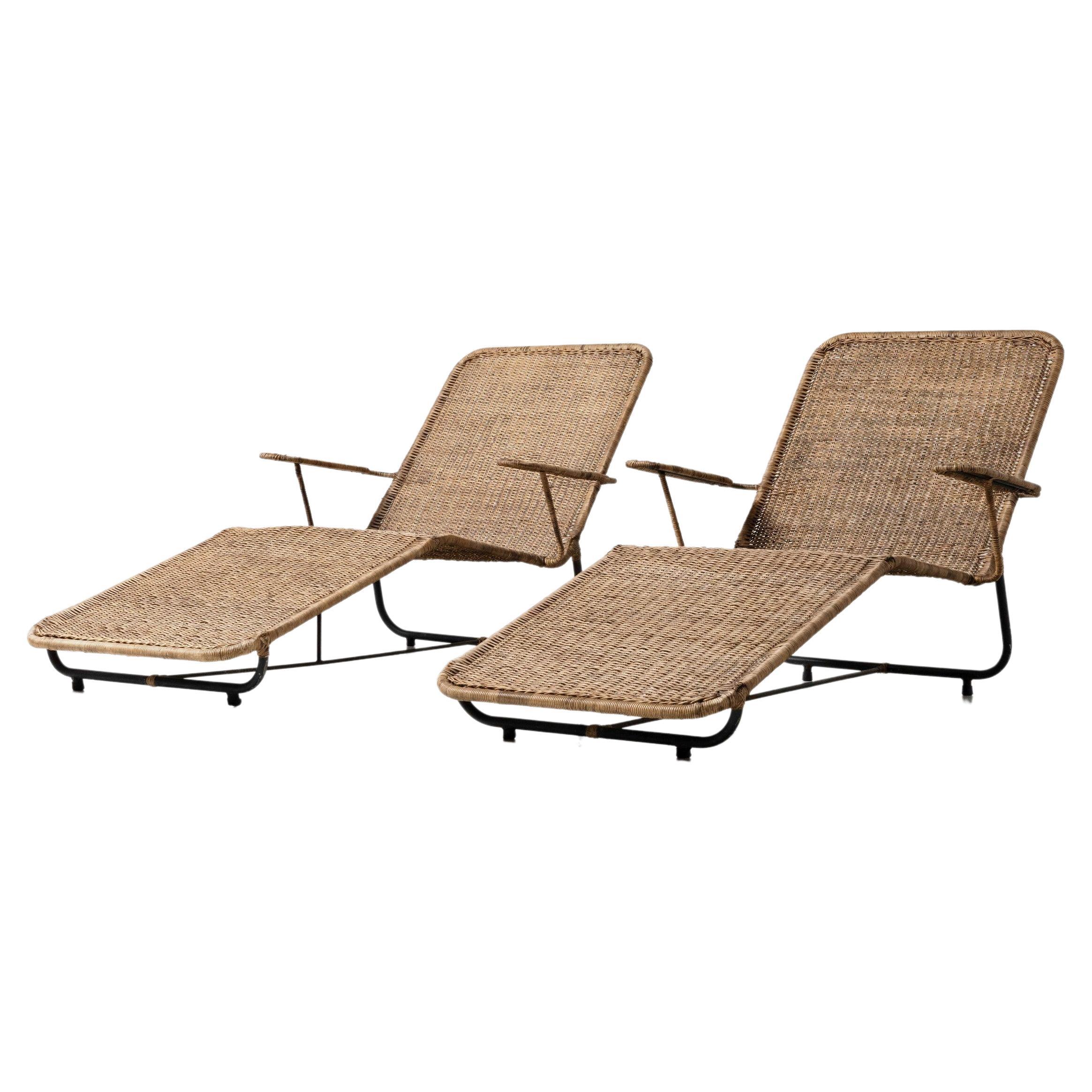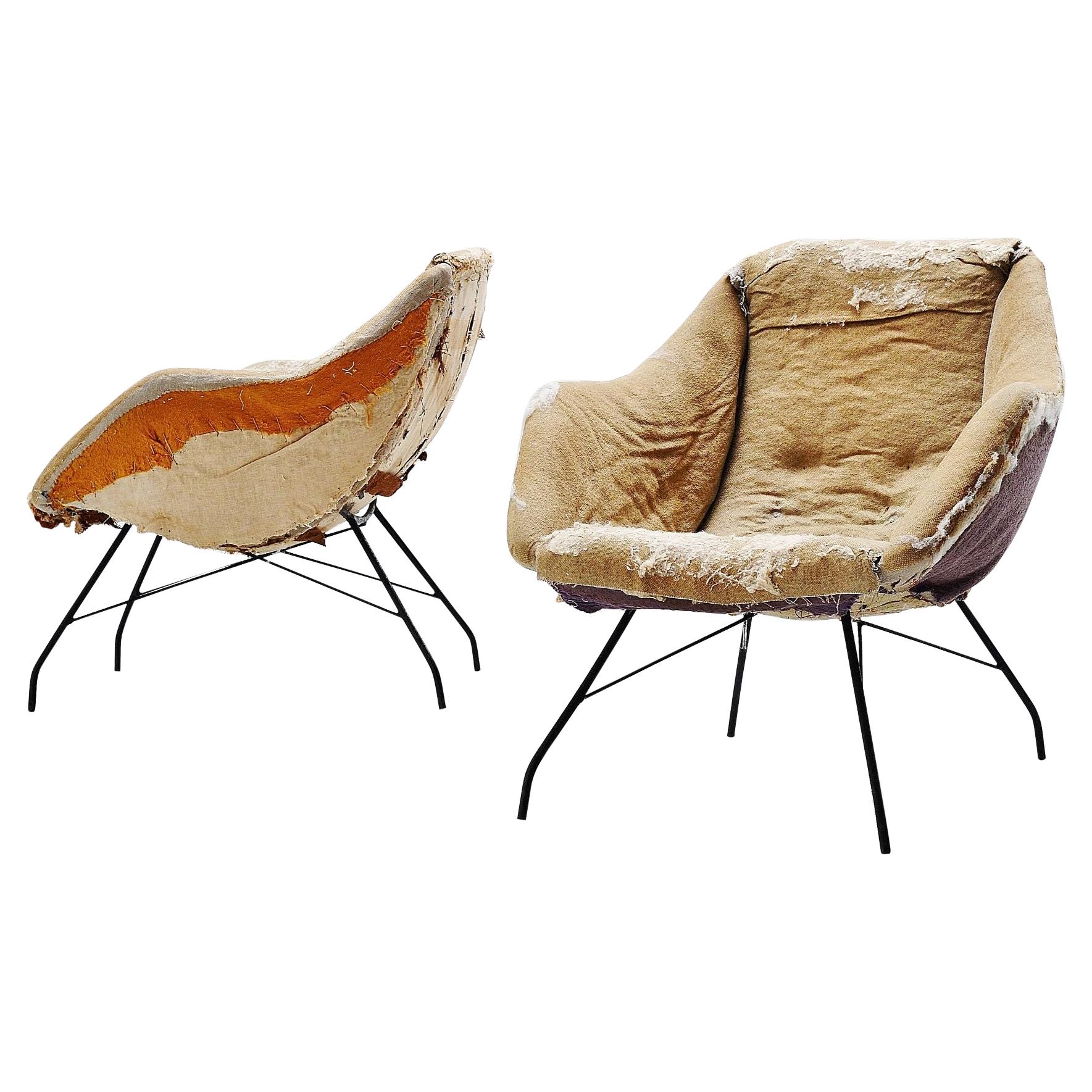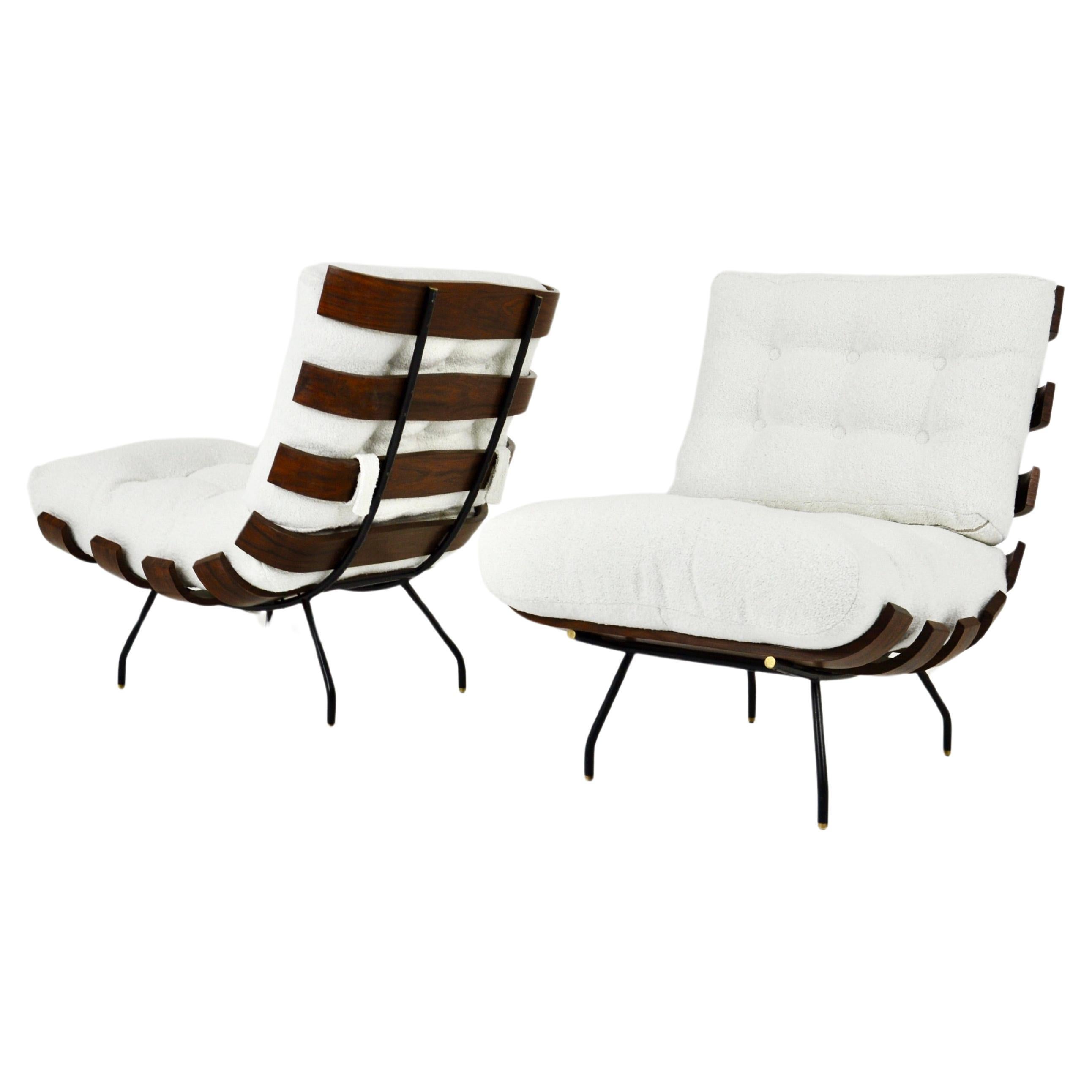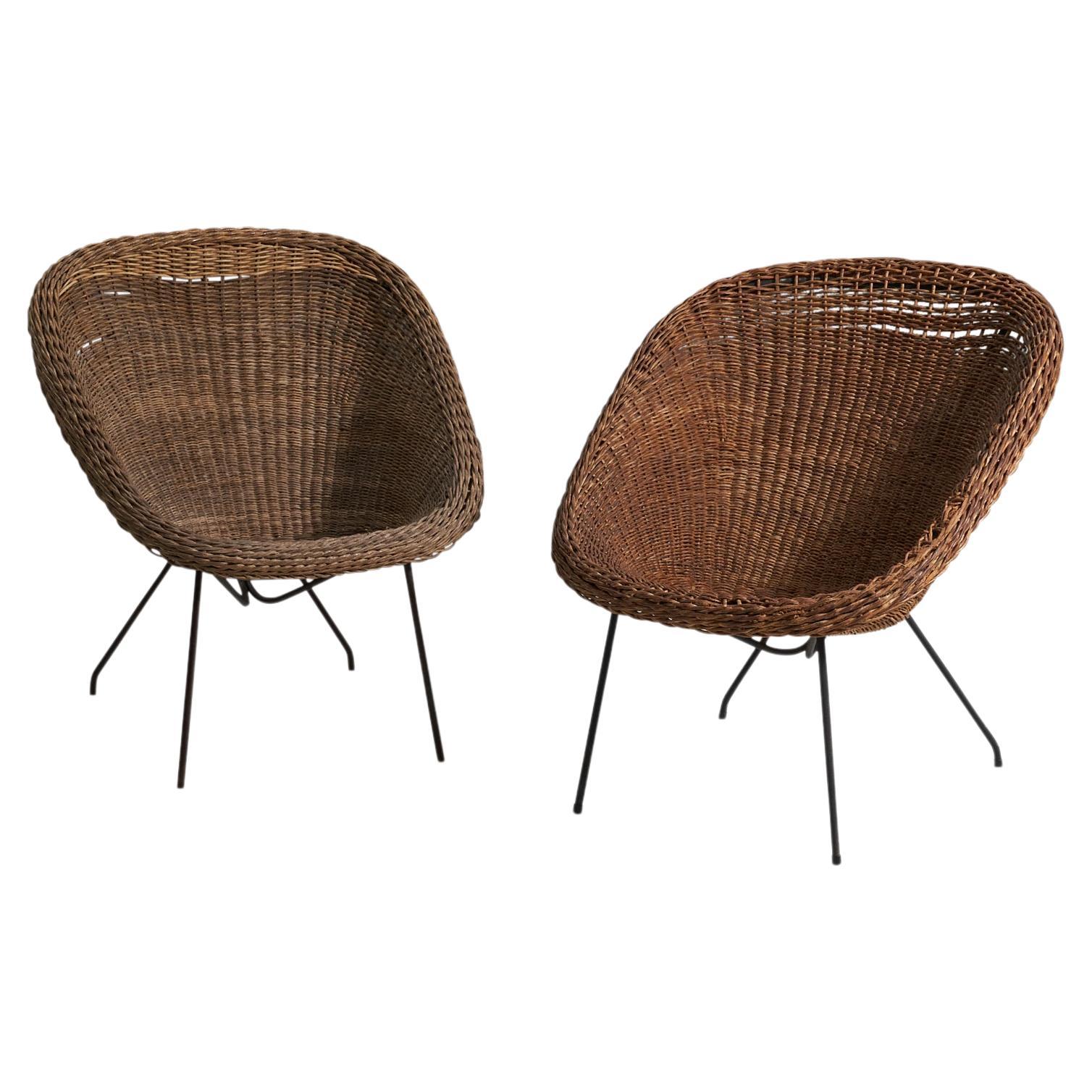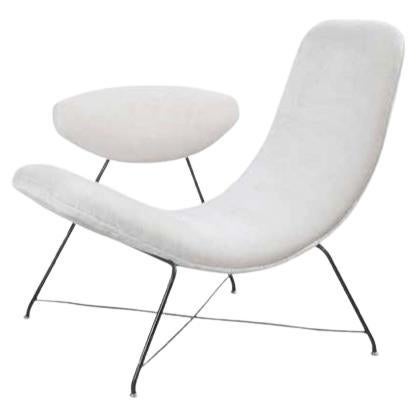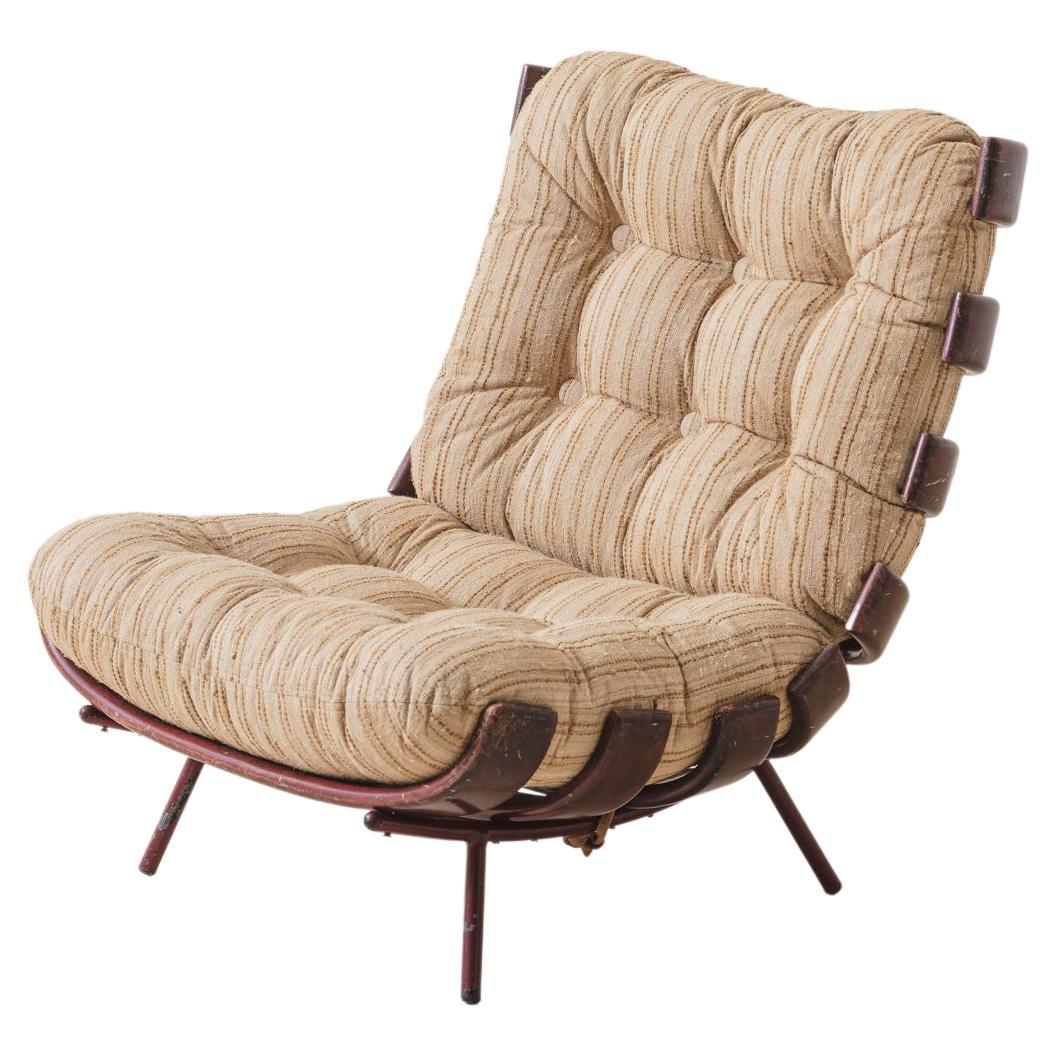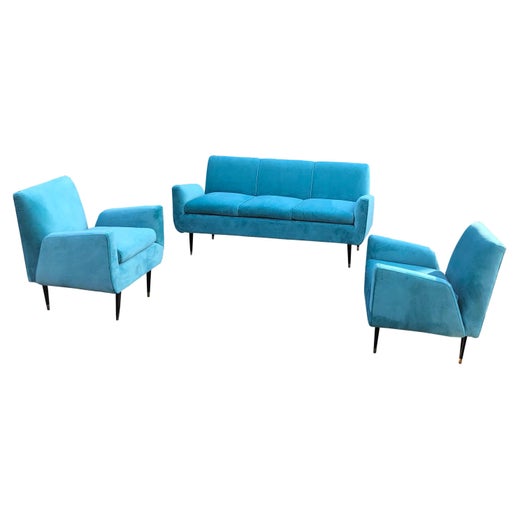Rare Martin Eisler & Carlo Hauner Lounge Chair in Iron and Rope
About the Item
- Creator:Carlo Hauner and Martin Eisler (Designer),Forma (Manufacturer)
- Dimensions:Height: 28.75 in (73 cm)Width: 25.4 in (64.5 cm)Depth: 26.78 in (68 cm)Seat Height: 13.39 in (34 cm)
- Style:Mid-Century Modern (Of the Period)
- Materials and Techniques:
- Place of Origin:
- Period:
- Date of Manufacture:1950s
- Condition:Wear consistent with age and use. Every item Morentz offers is checked by our team of 30 craftsmen in our in-house workshop. Special restoration or reupholstery requests can be done. Check ‘About the item’ or ask our design specialists for detailed information on the condition.
- Seller Location:Waalwijk, NL
- Reference Number:
Carlo Hauner and Martin Eisler
Forma began in São Paulo, under the leadership of Italian designer Carlo Hauner and Austrian architect and interior designer Martin Eisler. Hauner studied drawing and technical drawing at the Brera Academy in Milan. After participating in the Venice Biennale, he emigrated to São Paulo, where he established the furniture manufacturer Móveis Artesanal, for which Carlo and Martin — as well as Carlo’s brother Ernesto Hauner — would create a range of pieces for the home.
In 1936, Eisler earned a degree in architecture from the Academy of Fine Arts in Vienna, where he studied under Oskar Strnad and Clemens Holzmeister. With World War II looming, he left Austria immediately after graduating. He first went to Czechoslovakia, to which some of his family had already fled. In 1938, he moved to Buenos Aires, Argentina, and opened his interior design firm Interieur Forma.
Eisler relocated to Brazil in the early 1950s, where he met Hauner. At the time, Eisler had been looking for help producing furniture for his brother-in-law, Ernesto Wolf, and contacted Hauner. The two found that they had a shared vision, and with financial help from Wolf, they opened Galeria Artesanal as a storefront for Móveis Artesanal.
Looking to expand into international sales, the duo rebranded the company Forma. Sérgio Rodrigues, who helped launch a branch of Artesanal in Curitiba, was put in charge of interiors at Forma. That company soon became one of the biggest names in Brazilian furniture — it sold its own sculptural rattan lounge chairs, bookcases and other case pieces crafted with rosewood or jacaranda, and Forma was eventually distributing furniture licensed from iconic American manufacturer Knoll, thereby bringing works by noted designers such as Ludwig Mies van der Rohe, Charles Eames and Harry Bertoia to the Brazilian market.
Forma stands at the forefront of a revival of Brazilian modern furniture. Fashioned from high-grade regionally sourced hardwoods, leather and iron, even Forma's earliest creations have stood the test of time. The company’s alluring mid-century modern works appealed to homeowners at its peak, from the 1950s through the ’70s, and given the broadening interest in Brazilian furniture and the likes of designers such as Rodrigues, vintage Forma is making a major comeback today.
The Forma furniture company continued producing masterfully crafted furniture into the 1970s, until Eisler's death in 1977. Forma folded soon after, but Eisler's company in Argentina, Interieur Forma, is still in business today.
On 1stDibs, find vintage Carlo Hauner and Martin Eisler furniture for sale.
Forma
Forma stands at the forefront of a revival of Brazilian modern furniture. Fashioned from high-grade regionally sourced hardwoods, leather and iron, even Forma's earliest creations have stood the test of time. The company’s alluring mid-century modern works appealed to homeowners at its peak, from the 1950s through the ’70s, and given the broadening interest in Brazilian furniture and the likes of designers such as Sérgio Rodrigues, vintage Forma is making a major comeback today.
Forma began in São Paulo, under the leadership of Italian designer Carlo Hauner and Austrian architect and interior designer Martin Eisler. Hauner studied drawing and technical drawing at the Brera Academy in Milan. After participating in the Venice Biennale, he emigrated to São Paulo, where he established the furniture manufacturer Móveis Artesanal, for which Carlo and Martin — as well as Carlo’s brother Ernesto Hauner — would create a range of pieces for the home.
In 1936, Eisler earned a degree in architecture from the Academy of Fine Arts in Vienna, where he studied under Oskar Strnad and Clemens Holzmeister. With World War II looming, he left Austria immediately after graduating. He first went to Czechoslovakia, to which some of his family had already fled. In 1938, he moved to Buenos Aires, Argentina, and opened his interior design firm Interieur Forma.
Eisler relocated to Brazil in the early 1950s, where he met Hauner. At the time, Eisler had been looking for help producing furniture for his brother-in-law, Ernesto Wolf, and contacted Hauner. The two found that they had a shared vision, and with financial help from Wolf, they opened Galeria Artesanal as a storefront for Móveis Artesanal.
Looking to expand into international sales, the duo rebranded the company Forma. Sérgio Rodrigues, who helped launch a branch of Artesanal in Curitiba, was put in charge of interiors at Forma. That company soon became one of the biggest names in Brazilian furniture — it sold its own sculptural rattan lounge chairs, bookcases and other case pieces crafted with rosewood or jacaranda, and Forma was eventually distributing furniture licensed from iconic American manufacturer Knoll, thereby bringing works by noted designers such as Ludwig Mies van der Rohe, Charles Eames and Harry Bertoia to the Brazilian market.
The Forma furniture company continued producing masterfully crafted furniture into the 1970s, until Eisler's death in 1977. Forma folded soon after, but Eisler's company in Argentina, Interieur Forma, is still in business today.
Find vintage Forma seating, tables and storage pieces for sale on 1stDibs.
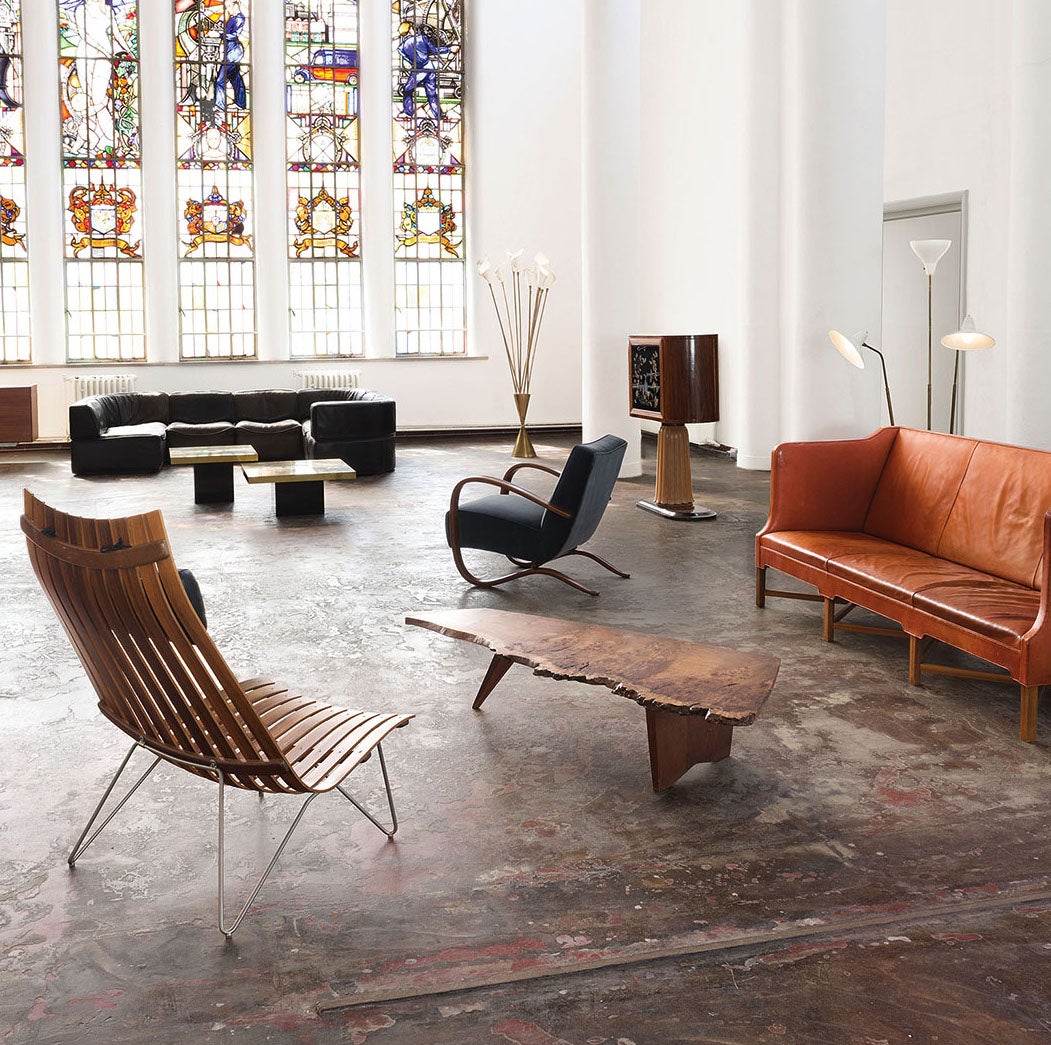
Established in 2006, Morentz has a team of approximately 55 restorers, upholsterers, interior advisers and art historians, making it a gallery, workshop and upholstery studio, all in one. Every day, a carefully selected array of 20th-century furniture arrives from all over the world at the firm’s warehouse, where the team thoroughly examines each piece to determine what, if any, work needs to be done. Whether that means new upholstery or a complete restoration, Morentz's aim is always to honor the designer’s intention while fulfilling the wishes of the client. The team is up to any challenge, from restoring a single piece to its original glory to furnishing a large-scale hotel project.
- ShippingRetrieving quote...Ships From: Waalwijk, Netherlands
- Return PolicyA return for this item may be initiated within 10 days of delivery.
- Carlo Hauner and Martin Eisler Lounge Chairs in Blue and Red UpholsteryBy Carlo Hauner and Martin EislerLocated in Waalwijk, NLCarlo Hauner and Martin Eisler, lounge chairs, iron, faux leather, Brazil, 1950s Elegant and modern armchairs by Brazilian designer duo Hauner & Eisler. The thin, elegant frame is made in black painted iron. Due to the diagonal connection and lines of the frame, these lounge chairs get a delicate appearance. The armrest runs smoothly over into the seating. The seat itself reclines backwards giving these chairs a playful dynamic appearance. The red and blue upholstery...Category
Vintage 1950s Brazilian Mid-Century Modern Lounge Chairs
MaterialsIron
- Martin Eisler & Carlo Hauner Early Edition 'Reversible' Chairs in LeatherBy Carlo Hauner and Martin EislerLocated in Waalwijk, NLMartin Eisler and Carlo Hauner, 'Reversible' lounge chairs, nubuck leather Long Beach - Grape Wine by Montebello, lacquered iron, brass, Brazil, 1955 The...Category
Vintage 1950s Brazilian Mid-Century Modern Lounge Chairs
MaterialsBrass, Iron
- Carlo Hauner and Martin Eisler for Forma 'Conchinha' Lounge ChairsBy Carlo HaunerLocated in Waalwijk, NLCarlo Hauner and Martin Eisler for Forma, 'Conchinha' lounge chairs, iron, fabric, Brazil, 1950s Elegant and modern armchairs by Brazilian designer duo Hauner & Eisler. The thin, el...Category
Vintage 1950s Brazilian Mid-Century Modern Lounge Chairs
MaterialsSteel
- Martin Eisler Lounge Chair in Black LeatherBy Martin EislerLocated in Waalwijk, NLMartin Eisler, lounge chair, iron, leather, Brazil, 1950s Elegant and modern lounge chair by Brazilian designer Martin Eisler. A visually interesting contrast is created between the...Category
Vintage 1950s Brazilian Mid-Century Modern Lounge Chairs
MaterialsIron
- Large Italian Lounge Chair in Stained Pine and Rope SeatingLocated in Waalwijk, NLLounge chairs, stained pine, rope, Italy, 1970s The designer of this Italian lounge chair truly wanted to impress the viewer with a monumental, volumetric design. The wide frame in ...Category
Vintage 1970s Italian Mid-Century Modern Lounge Chairs
MaterialsRope, Pine
- Large Italian Lounge Chair in Stained Pine and Rope SeatingLocated in Waalwijk, NLLounge chair, stained pine, rope, Italy, 1970s The designer of this Italian lounge chair truly wanted to impress the viewer with a monumental, volumetric design. The wide frame in s...Category
Vintage 1970s Italian Mid-Century Modern Lounge Chairs
MaterialsRope, Pine
- Carlo Hauner and Martin Eisler Rattan Lounge Chairs Brazil 1955By Carlo Hauner and Martin Eisler, FormaLocated in Roosendaal, Noord BrabantA beautiful pair of lounge chairs in rattan by Carlo Hauner and Martin Eisler, made by Forma Móveis in Brazil in 1955. The chairs are in fully original condition and have never been ...Category
Vintage 1950s Brazilian Mid-Century Modern Chaise Longues
MaterialsMetal
- Concha Lounge Chairs Carlo Hauner Martin Eisler, Brazil, 1950By Carlo Hauner and Martin Eisler, FormaLocated in Roosendaal, Noord BrabantStunning and fully original pair of 'Concha' (shell) lounge chairs designed by Carlo Hauner and Martin Eisler and manufactured by Forma Moveis, Brazil 1950. These chairs have a solid...Category
Vintage 1950s Brazilian Mid-Century Modern Lounge Chairs
MaterialsMetal
- Costela Lounge chairs by Martin Eisler and Carlo Hauner for Forma, 1950sBy Forma, Carlo Hauner and Martin EislerLocated in Lasne, BE2 Costela lounge chairs in wood, metal legs and curly fabric cushions by Martin Eisler and Carlo Hauner. Seat height: 48 cm. Wear due to time and age of the lounge chairs.Category
Vintage 1950s Brazilian Mid-Century Modern Lounge Chairs
MaterialsMetal
- Martin Eisler Carlo Hauner, Lounge Chairs, Rattan, Steel, Forma, Brazil, c. 1955By Carlo Hauner and Martin Eisler, FormaLocated in High Point, NCA pair of rattan and steel lounge chairs designed by Martin Eisler and Carlo Hauner and produced by Forma, Brazil, c. 1955.Category
Vintage 1950s Brazilian Mid-Century Modern Lounge Chairs
MaterialsSteel
- Carlo Hauner and Martin Eisler Reversible ChairBy Carlo Hauner and Martin EislerLocated in London, GBThis “Reversivel” (Reversible) chair is without a doubt a Brazilian design icon. It is considered to be one of the most emblematic armchairs of Brazilian modern design. Martin Eisler...Category
Vintage 1950s Brazilian Mid-Century Modern Lounge Chairs
MaterialsBrass, Iron
- Martin Eisler and Carlo Hauner "Costela" Lounge Chair, Brazil, 1953By Carlo Hauner and Martin EislerLocated in New York, NYThe Costela armchair is an iconic Brazilian Mid-Century Modern piece. It was designed by Martin Eisler (1913 - 1977) in 1953 and manufactured by the c...Category
Vintage 1950s Brazilian Mid-Century Modern Lounge Chairs
MaterialsFabric, Hardwood
Recently Viewed
View AllRead More
You Don’t Need a Fictional Fairy to Get This Real Pinocchio Lamp
Warm chalet style meets cool Bauhaus functionality in Pietro Cascella’s cleverly carved creation.
Morentz Writes the Next Chapter for Furniture with a Storied Past
Dutch dealer Matthijs Hoveijn specializes in the best of mid-century modern design, selling it to discerning clients around the world.
